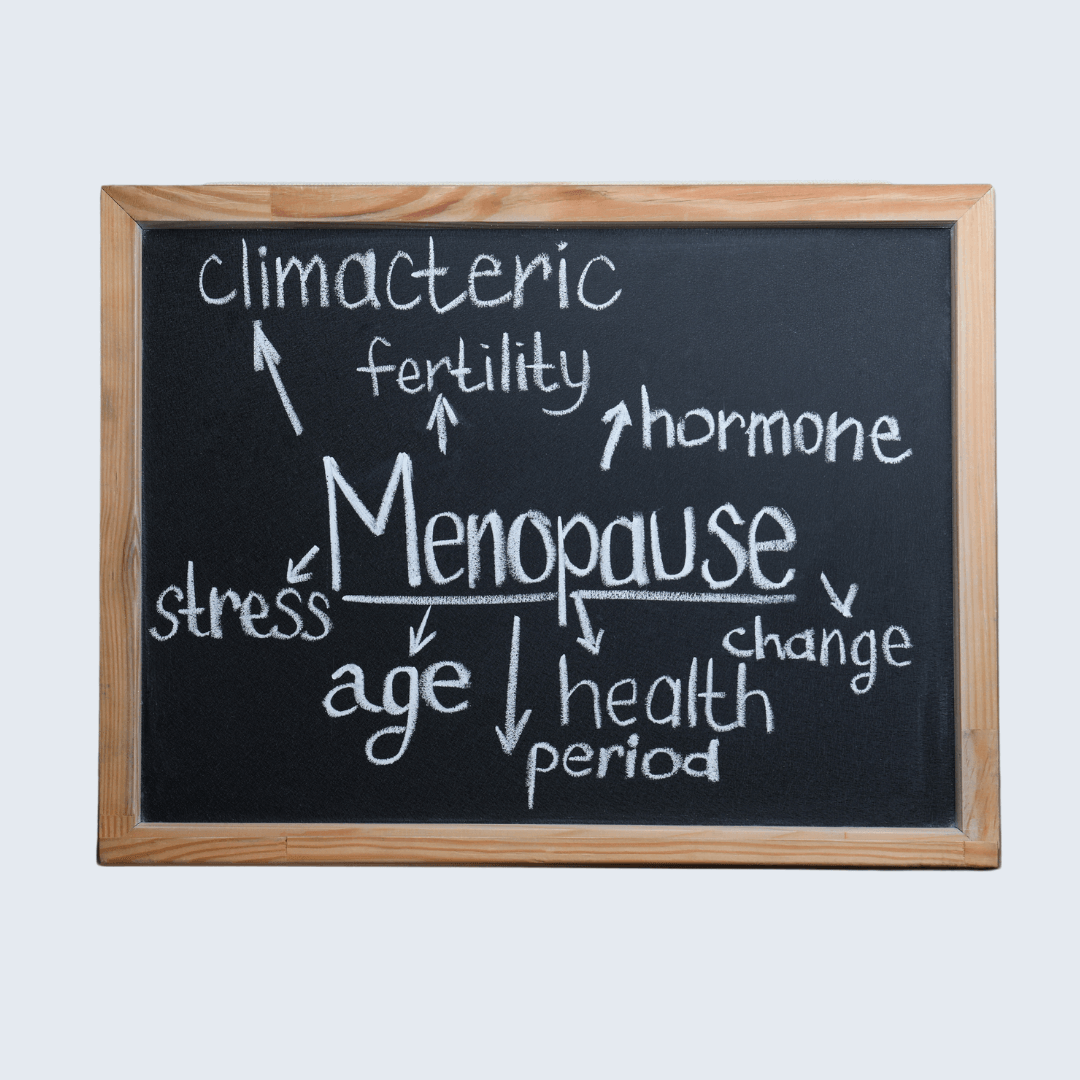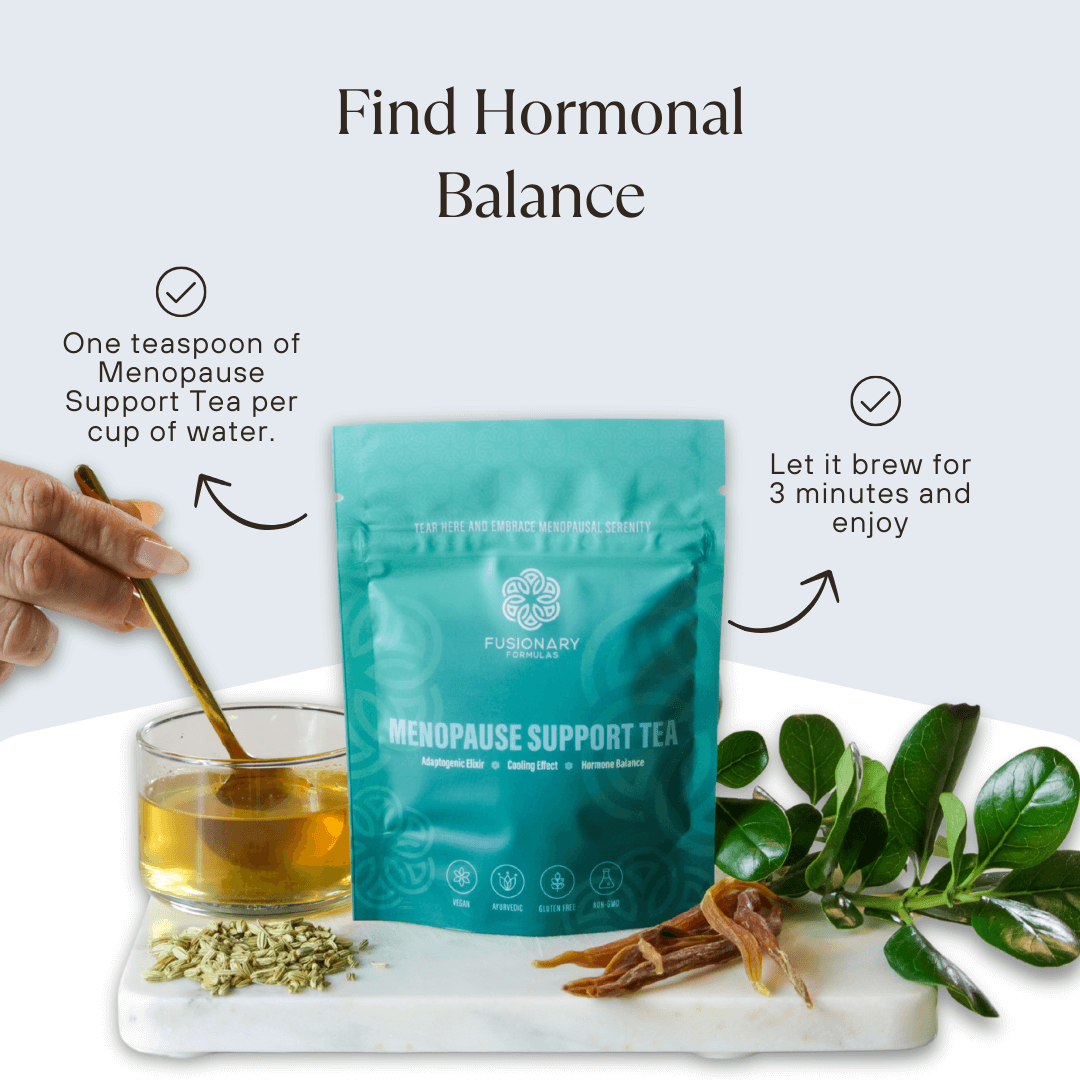
For women going through menopause, hormonal transitions can be both physically and emotionally challenging. But did you know that herbal tea blends can offer natural support during this transitional phase? In this article, we explore the potential benefits of herbal teas for easing menopausal symptoms and promoting overall well-being.
During menopause, estrogen levels decline, leading to a variety of symptoms such as hot flashes, night sweats, mood swings, and sleep disturbances. Herbal blends, specifically formulated with ingredients such as fennel seed, shatavari, and chamomile, have traditionally been used to ease these symptoms.
By incorporating these herbal teas for menopause, into your daily routine, you may find relief from the discomforts of menopause. Continue reading to find out more about the different types of tea blends available and their potential benefits for easing hormonal transitions.
Understanding Menopause and Its Symptoms
Menopause marks a significant transition in a woman's life, generally occurring between the ages of 45 and 55. It signifies the end of menstrual cycles and fertility, primarily due to the natural decline in reproductive hormones, particularly estrogen and progesterone. This phase can be divided into three stages: perimenopause, menopause, and postmenopause. During perimenopause, which can last several years, women often experience irregular periods and a variety of symptoms as hormone levels fluctuate. Menopause is officially diagnosed when a woman has not had a menstrual period for 12 consecutive months. Postmenopause follows this stage, where symptoms may continue or even evolve.
The symptoms accompanying menopause can vary significantly from one woman to another. Common experiences include hot flashes, night sweats, mood changes, sleep disturbances, and vaginal dryness. Hot flashes, characterized by sudden sensations of heat that can cause sweating and discomfort, are among the most well-known symptoms. These experiences can be mild or severe, impacting daily life and overall well-being. Mood swings and irritability can also surface, often attributed to hormonal fluctuations, leading to feelings of anxiety and sadness.
Additionally, menopause can lead to physical changes that may affect confidence and self-esteem. Women may experience weight gain, thinning hair, and changes in skin elasticity. The emotional toll of these changes, combined with physical discomfort, can make this transition particularly challenging. Understanding these symptoms is crucial, as it empowers women to seek effective remedies and support systems that can ease their journey through menopause.
The Role of Hormonal Transitions in Menopause

Hormonal transitions are central to the menopausal experience, as they dictate the changes in a woman's body during this period. Estrogen, the primary hormone affected, plays a vital role in regulating various bodily functions, including the menstrual cycle, bone density, and mood. As a woman approaches menopause, the ovaries gradually produce less estrogen. This decline leads to the disruption of the hormonal balance, causing the characteristic symptoms of menopause.
One critical aspect of hormonal transitions is the impact on the body's thermoregulation. The hypothalamus, which regulates body temperature, becomes more sensitive to hormonal changes, leading to the phenomenon of hot flashes. While this is a well-documented symptom, it can also trigger a cascade of other effects, such as sleep disturbances and increased heart rate. The fluctuations in hormones can also lead to mood swings, making emotional regulation more challenging for many women.
Moreover, the decline in estrogen affects other bodily systems, including bone health. Estrogen is essential for maintaining bone density, and its reduction can lead to an increased risk of osteoporosis. This highlights the importance of addressing hormonal changes not only for immediate symptom relief but also for long-term health. Understanding the role of hormonal transitions provides a foundation for exploring effective natural remedies, including herbal teas, which can support women during this complex phase of life.
Benefits of Herbal Tea for Menopause
Herbal teas have been used for centuries in various cultures as natural remedies for a multitude of ailments, including those associated with menopause. One of the primary benefits of herbal teas is their holistic approach to health. Unlike conventional medications, which often focus on specific symptoms, herbal teas can provide a broader range of support through their various phytochemicals and antioxidants. These compounds can help regulate hormonal fluctuations, reduce inflammation, and promote relaxation, making them an excellent choice for women going through menopause.
In addition, many herbal ingredients have been recognized for their specific properties that can alleviate menopausal symptoms.
The following herbs, included in our Menopause Support Tea blend, are formulated to offer support during this transition:
- Fennel Seeds: Not only are these seeds known to support gut health and digestion, but they are also a rich source of antioxidants. Antioxidants are critical in reducing damage caused by free radicals, which can exacerbate menopausal symptoms.
- Tulsi (Holy Basil): A powerful adaptogen that helps balance hormone levels, particularly by decreasing the stress hormone cortisol. During menopause, the adrenal system fluctuates hormonally, which can increase stress and other related symptoms. Tulsi supports this system, helping women maintain emotional balance
- Shatavari: A highly prized adaptogen in Ayurvedic medicine, Shatavari supports women at all stages of the reproductive cycle, including the menopausal period. It has traditionally been used to balance hormones and improve women's overall well-being.
- Fenugreek: Known for its ability to normalize blood glucose levels, fenugreek may be helpful during menopause, as some women may experience fluctuations in blood sugar due to hormonal changes. Glucose control is key to maintaining stable energy levels and reducing symptoms of hormonal imbalance.
Popular Herbal Tea Blends for Menopause
There are several herbal tea blends specifically designed to address the symptoms associated with menopause. Each blend typically combines various herbs known for their supportive properties. One popular option is a blend featuring black cohosh, red clover, and sage. Black cohosh is particularly noted for its potential to alleviate hot flashes and mood swings, while red clover contains phytoestrogens that mimic estrogen in the body. Sage is often used for its antiperspirant properties and can help reduce night sweats.
Another effective blend includes dong quai, chamomile, and peppermint. Dong quai is known as a traditional remedy for hormonal balance, while chamomile is widely recognized for its calming effects, promoting relaxation and better sleep. Peppermint adds a refreshing flavor while also aiding digestion, which can be beneficial during menopause when digestive issues may arise. This combination not only addresses multiple symptoms but also creates a pleasant drinking experience.
Finally, a soothing blend of lemon balm, valerian root, and hibiscus can be beneficial for emotional well-being. Lemon balm is known for its ability to reduce anxiety and improve mood, making it an excellent choice for emotional support during menopause. Valerian root is often used as a natural remedy for insomnia, helping to promote restful sleep. Hibiscus not only adds a vibrant color but is also rich in antioxidants, contributing to overall health. By selecting the right herbal blends, women can tailor their tea-drinking experience to their specific menopausal symptoms.
How Herbal Tea Can Help Alleviate Menopausal Symptoms

Herbal teas can be a powerful ally in relieving menopausal symptoms thanks to their various properties. The calming effects of certain herbs can help manage stress and anxiety, which are common during this transitional phase. For example, chamomile can promote relaxation, making it easier for women to cope with the emotional ups and downs that often accompany hormonal changes. By encouraging a sense of calm, these teas can pave the way for improved sleep and emotional stability.
Hot flashes and night sweats are among the most uncomfortable symptoms of menopause, and herbal teas can provide relief thanks to their cooling properties. Herbal blends containing sage and mint can help regulate body temperature and reduce the frequency and intensity of hot flashes.
Adaptogenic herbs, such as Shatavari and Tulsi, work with the body to reduce stress and support hormonal health. Fennel helps relieve bloating and promotes better digestion, which can be beneficial as many women experience digestive discomfort during this phase. Drinking these infusions can not only refresh the body, but also offer a moment of tranquility, allowing women to breathe and focus during a bout of hot flashes.
Additionally, the antioxidant and anti-inflammatory properties of these herbs have been shown to help reduce chronic inflammation, one of the main factors that exacerbate menopausal symptoms.
Incorporating Herbal Tea into Your Daily Routine

Incorporating herbal teas into your daily routine is a simple and effective way to support your well-being during menopause. By drinking a cup of Menopause Support Tea every day, you can create a relaxing ritual that also supports your hormonal and digestive health.
Start by setting a specific time each day for your tea ritual, either in the morning to start your day or in the evening to wind down. Creating a routine helps signal to your body that it's time to relax and enjoy the calming benefits of herbal tea.
Additionally, consider pairing your tea with mindfulness practices. Take a few minutes to breathe deeply while drinking your tea to enhance its calming effects. You can also try incorporating gentle stretching or meditation during tea time to further promote relaxation. By making herbal tea By drinking tea, a mindful practice, you not only nourish your body but also cultivate a moment of peace amid the hormonal transitions of menopause.
Other Natural Remedies for Menopause
While herbal teas can be an effective tool for managing menopausal symptoms, they are most beneficial when combined with other natural remedies. Lifestyle changes play a crucial role in alleviating discomfort during this transitional phase. Regular exercise, for example, can help regulate mood, improve sleep, and maintain a healthy weight. Activities such as yoga and tai chi not only promote physical health but also encourage relaxation and mindfulness, which can be particularly beneficial during menopause.
Diet is another critical factor in managing menopausal symptoms. A balanced diet rich in fruits, vegetables, whole grains, and healthy fats can support hormonal balance and overall well-being. Foods high in phytoestrogens, like flaxseeds and soy products, may help mimic estrogen's effects in the body, potentially easing symptoms like hot flashes. Staying hydrated is equally important; drinking plenty of water throughout the day can help alleviate dryness and support overall health.
Additionally, mindfulness practices such as meditation and deep breathing exercises can help mitigate stress and anxiety. These practices encourage relaxation, allowing women to cope more effectively with the emotional challenges of menopause. Combining these natural remedies with herbal tea can create a holistic approach to managing menopausal symptoms, promoting a healthier and more balanced lifestyle.
Precautions and Considerations When Using Herbal Tea for Menopause
While herbal teas can offer numerous benefits during menopause, it is essential to approach their use with caution and awareness. Not all herbs are suitable for everyone, and some may interact with medications or exacerbate certain health conditions. Before incorporating new herbal teas into your routine, it's advisable to consult with a healthcare professional, particularly if you have existing health concerns or are currently taking medications.
Additionally, quality matters when it comes to herbal teas. Opt for high-quality products from reputable sources to ensure that you are getting the best possible ingredients without harmful additives. Always read labels carefully and look for organic options when possible. This can help reduce exposure to pesticides and other chemicals that may diminish the health benefits of the herbs.
Moreover, it's essential to pay attention to your body's responses when trying new herbal blends. Everyone's body is different, and what works for one person may not work for another. Keep track of how you feel after consuming different teas, noting any improvements or adverse reactions. This awareness can help you tailor your herbal tea choices to best support your individual needs during menopause.
Where to Find High-Quality Herbal Teas for Menopause
Finding high-quality herbal teas specifically formulated for menopausal support can enhance your experience and effectiveness. Many health food stores and specialty tea shops offer a selection of herbal blends designed for women's health. Look for teas that specifically mention their benefits for menopause, as these are often curated with the right ingredients to target common symptoms.
Online retailers also provide a vast array of options, allowing you to explore various brands and blends from the comfort of your home. When purchasing online, read customer reviews to gauge the effectiveness and quality of the products. Websites specializing in herbal remedies often provide detailed descriptions of the ingredients, their potential benefits, and brewing instructions, making it easy to find the right fit for your needs.
Additionally, consider exploring local herbalists or wellness practitioners who may offer their own blends. These professionals often have a wealth of knowledge about herbal remedies and can provide personalized recommendations based on your individual symptoms and preferences. By sourcing your herbal teas from reputable and knowledgeable sources, you can ensure that you are using high-quality products to support your journey through menopause.
Conclusion: Embracing the Power of Herbal Tea During Menopause
Menopause can be a difficult time in a woman's life, but with the right support from natural remedies, such as herbal teas, it is possible to effectively address symptoms and balance hormones. Herbs such as tulsi, shatavari, and fenugreek are formulated to work in harmony with the body and provide much-needed relief during this hormonal transition.
Incorporate Menopause support tea into your daily routine to help naturally balance your hormones and enjoy a better quality of life during menopause. From reducing hot flashes to promoting relaxation and emotional stability, the right herbal blends can help women manage their experiences more effectively.
By understanding the benefits of herbal teas and exploring different blends, you can create a personalized approach that suits your needs. Along with lifestyle changes and mindfulness practices, herbal teas can contribute to a holistic strategy for navigating menopause. By embracing this natural remedy, you can find a renewed sense of balance and well-being during this important life transition.
Ultimately, the power of herbal tea lies not only in its health benefits, but also in the moments of self-care and mindfulness it fosters. By taking time each day to savor a soothing cup of tea, you can cultivate a sense of peace and resilience, making your journey through menopause a more manageable and enriching experience.








